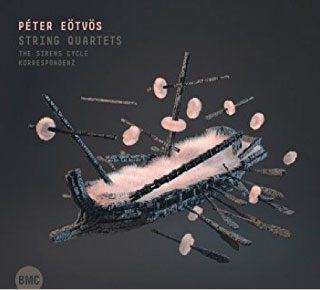The Sirens Cycle
for soprano and string quartet
Co-commissioned by Wigmore Hall with the support of André Hoffmann, president of the
Foundation Hoffmann, a Swiss grantmaking foundation; Tonhalle-Gesellschaft Zürich;
Alte Oper Frankfurt; Centro Nacional de Difusion Musical Madrid;
Ircam-Centre Pompidou, Paris, ProQuartet-Centre européen de musique de chambre,
Paris and by the Südwestrundfunk (Kompositionsauftrag des Südwestrundfunks)
Description
First performance: 1 October 2016 – London, England
Wigmore Hall
Calder Quartet
Piia Komsi, soprano
The first part of The Sirens’ Cycle with soprano can also be performed separately (21′)
My compositions always have a narrative character; they are mostly rooted in spoken language. This becomes apparent in the subject matters that I tend to choose and also in my preference of highly accurate musical articulation. I am especially happy to write compositions for string instruments because they can produce exceedingly speech-like and finely articulate sounds ranging from extremely deep to extremely high tones thanks to their enormous wealth of sound colours and very extensive tone range.
The Sirens Cycle is the developed version of an operatic idea. It is dominated by a soprano voice accompanied by a string quartet, similarly to a choir throughout the piece. The starting point for this composition was Franz Kafka’s absurd short story, The Silence of the Sirens. The motif of the Sirens started to occupy my mind so much that I decided to make a thematic connection and draw in the Siren-motifs used by Joyce and Homer. This is how a cycle of three parts of very different characters came to life. Their diversity stands for an idea of the song or the silence of the sirens.
The various foreign languages influence the style of my compositions to a great extent. In The Sirens Cycle, the musical material changes according to the language used by the individual authors: the 1st movement JOYCE is in English, the 2nd movement HOMER is in Ancient Greek, while the 3rd movement KAFKA is in German.
/Peter Eötvös – 2016/
Synopsis
Parts:
1st part: Joyce (1-7 movements)
Interlude
2nd part: Homer
3rd part: Kafka
ATTENTION: There are other compositions named Joyce:
Joyce for clarinet and string quartet >
Joyce for clarinet solo >
The Sirens Cycle consists of three movements for string quartet with soprano and two electronic interludes. The negation of song in Franz Kafka’s Das Schweigen der Sirenen [The Silence of the Sirens] inspired me to compose a work reflecting on song itself. I took an extract from Ulysses by James Joyce and requested IRCAM in Paris to transform the text through spectral analysis into pitches, note values and tone colours. In the first movement, I strictly adhered to the resulting note sequence, but increasingly became liberated from it during the progress of the work. I linked the quartet movements with interludes evoking audible associations with the song of the sirens.
/Peter Eötvös/
Performances
Eötvös: Korrespondenz, The Sirens Cycle
Calder Quartet, Piia Komsi
Venue: Budapest Music Center
Eötvös: The sirens cycle
Audrey Luna, soprano
Cond: Peter Eötvös
Calder Quartet
Eötvös: The sirens cycle
Audrey Luna, soprano
Cond: Peter Eötvös
Calder Quartet
Eötvös: The sirens cycle
Audrey Luna, soprano
Cond: Peter Eötvös
Calder Quartet
IRCAM
Eötvös: The sirens cycle
Barbara Hannigan, soprano
Cond: Peter Eötvös
Calder Quartet
Eötvös: The sirens cycle
Barbara Hannigan, soprano
Calder Quartet
Cond: Peter Eötvös
Eötvös: The sirens cycle
Audrey Luna, soprano
Calder Quartet
Cond: Peter Eötvös
Tonhalle
Eötvös: The sirens cycle
World premiere
Barbara Hannigan, soprano
Calder Quartet
Cond: Peter Eötvös
Wigmore Hall
Details
Publisher information
Schott Music Mainz
https://en.schott-music.com/shop/the-sirens-cycle-no319273.html
Orchestration

soprano and string quartet
Further information
“Meine Kompositionen haben immer einen erzählerischen Charakter, sie gehen meistens aus der gesprochene Sprache hervor. Dies zeigt sich bei der Themenwahl meiner Stücke und auch durch die Neigung zur sehr präzisen musikalischen Artikulation. Besonders glücklich bin ich, wenn ich für Streichinstrumente komponiere, weil die Streicher durch ihren enormen Reichtum der Klangfarben, durch den großen Umfang der Tonhöhen – von der brummende Tiefe bis zur pfeifenden Höhe – besonders fein, “sprachartig” artikulieren können.
The Sirens Cycle ist die Weiterentwicklung einer opernhaften Idee, diesmal von einer Sopranstimme geführt, die von dem Streichquartett wie von einem Chor ständig begleitet wird.
Ausgangspunkt für diese Komposition war Franz Kafkas absurde Text: Das Schweigen der Sirenen. Dieses Thema hat mich so beschäftigt, dass ich durch eine thematische Verbindung die Sirenen-Motive von Joyce und Homer hinzugezogen habe. So entstand ein Zyklus von 3 Teilen, die sehr unterchiedliche Charaktere haben, aber auch in Ihrer Vielfarbigkeit eine Idee verkörpern: den Gesang, oder eben das Schweigen der Sirenen.
Die verschiedenen Sprachen beeinflussen maßgebend den Stil meiner Kompositionen. Im The Sirens Cycleändert sich das muzsikalische Materila je nach Originalsprache der einzelnen Autoren: Wir hören den ersten Satz: JOYCE auf English, den zweiten: HOMER auf Altgriechisch, und den dritten Satz: KAFKA auf Deutsch.
Die Musik is eine Weltsprache.
/Peter Eötvös – 2016/
